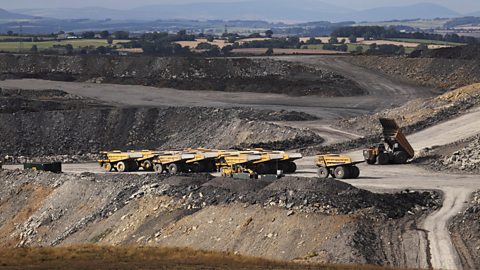Case study: fossil fuel extraction - coal mining, Northumberland
A company called Banks Mining plan to open a new opencast coal mine in Northumberland. This is a way of extractingWhen something is taken away from or out of something else. coal by scraping away the Earth's surface, rather than digging down. The company want to extract coal until 2027. By 2032, they will have restored the site back to its former beauty.
Location
Druridge Bay lies to the north of Newcastle-upon-Tyne on the north east coast of the UK. It lies between the villages of Ellington and Widdrington. The site contains 7 million tonnes of coal, which will take approximately 10 years to extract.
Advantages
The extraction of coal at Druridge Bay could bring many advantages:
- It will create more than 150 jobs up to and beyond 2032. This will make a big difference to the economyActivities in a country concerned with the making, distribution, and use of goods and services. of the area.
- It could become a visitor attraction when restored. Banks Mining is working with Northumberland Tourism and the Northumberland Wildlife Trust regarding this phase of the project.
- Coal from Druridge Bay could be used in UK power stations. This keeps money within the country and reduces the pollution that is created when coal is transported over long distances.
Disadvantages
- Fine particles caused by opencast mining affect air quality. This can cause health problems for the eyes, nose and throat. It can also lead to breathing difficulties.
- Noise from blasting and vibration could occur, even outside of normal working hours. This could cause sleep disturbance and hearing loss.
- Congestion on local roads is likely to increase as vehicles such as lorries will regularly use the site.
- Producing energy from coal increases the UK's carbon emissionsThe release of carbon dioxide gas into the atmosphere., which are linked to global warmingThe rise in the average temperature of the Earth's surface. .

Opencast coal mining creates fine particles which pollute the air